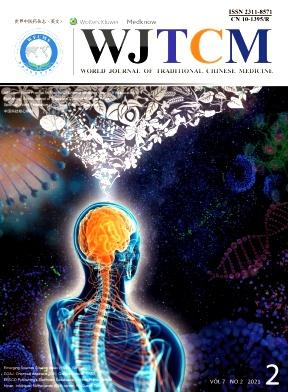Exploring the mechanism of Tripterygium wilfordii against cancer using network pharmacology and molecular docking
IF 3.2
3区 医学
Q1 INTEGRATIVE & COMPLEMENTARY MEDICINE
引用次数: 5
Abstract
Background: The root of Tripterygium wilfordii (Tripterygii radix), a natural powerful traditional Chinese medicine (TCM) for various diseases treatment, has been used for centuries in the Asian countries as anti-rheumatoid arthritis (RA) agent, antioxidant agent, and anti-inflammatory agent. Its combination with other herbs in treating RA has been explored. The anti-RA effect of T. wilfordii for cancer treatment has been supported by some evidence. Aims and Objectives: To investigate the anticancer mechanism of T. wilfordii, bioinformatics databases were used to identify its active ingredients. Materials and Methods: Target proteins associated with cancer were determined using a network pharmacology analysis platform, and 25 key active compounds and 55 key targets of T. wilfordii were identified in our study. A common potential mechanism of T. wilfordii involvement in cancer was disclosed by in-depth network analysis of diseases, functions, and pathways. Finally, the analysis results of the TCM-disease target protein interaction network revealed 5 potential targets; subsequently, a total of 30 targets (these 5 targets, as well as 25 previously identified compounds) were subjected to molecular docking. Results: Our results showed that the therapeutic effect of T. wilfordii in cancer is characterized by multiple components, targets, and pathways. The regulation of signaling pathways such as Kaposi sarcoma-associated herpes virus infection, colorectal cancer, small-cell lung cancer, and prostate cancer may be the important pharmacodynamic basis of anticancer therapy. Conclusion: Triptonoditerpenic acid inhibited proliferation and induced apoptosis in SW480 cells. The mechanism may be related to the downregulation of Bcl-2 expression, upregulation of Bax mRNA expression, and expression inhibition of PTGS2.应用网络药理学和分子对接技术探讨雷公藤抗癌症作用机制
背景:雷公藤是一种治疗各种疾病的天然强效中药,在亚洲国家已被用作抗类风湿性关节炎(RA)剂、抗氧化剂和抗炎剂达数百年之久。已对其与其他草药联合治疗RA进行了探索。一些证据支持T.wilfordii对癌症治疗的抗RA作用。目的:利用生物信息学数据库对其有效成分进行鉴定,探讨雷公藤的抗癌机制。材料与方法:利用网络药理学分析平台,对癌症相关靶蛋白进行了测定,确定了雷公藤的25个关键活性化合物和55个关键靶点。通过对疾病、功能和途径的深入网络分析,揭示了T.wilfordii参与癌症的常见潜在机制。最后,对中药疾病靶蛋白相互作用网络的分析结果揭示了5个潜在靶点;随后,对总共30个靶标(这5个靶标以及25个先前鉴定的化合物)进行分子对接。结果:我们的研究结果表明,雷公藤对癌症的治疗作用具有多组分、多靶点和多途径的特点。卡波西肉瘤相关疱疹病毒感染、结直肠癌癌症、小细胞肺癌癌症和癌症等信号通路的调节可能是抗癌治疗的重要药效学基础。结论:三酮二萜酸抑制SW480细胞增殖,诱导细胞凋亡。其机制可能与Bcl-2表达下调、Bax mRNA表达上调和PTGS2表达抑制有关。
本文章由计算机程序翻译,如有差异,请以英文原文为准。
求助全文
约1分钟内获得全文
求助全文
来源期刊

World Journal of Traditional Chinese Medicine
Medicine-Complementary and Alternative Medicine
CiteScore
5.40
自引率
2.30%
发文量
259
审稿时长
24 weeks
 求助内容:
求助内容: 应助结果提醒方式:
应助结果提醒方式:


